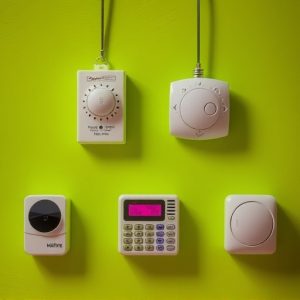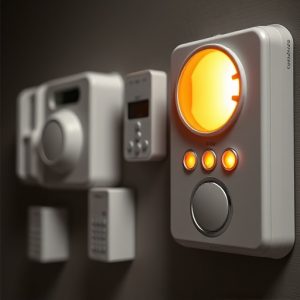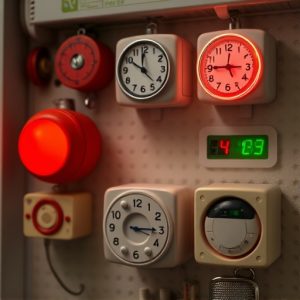Personal Safety Devices: Protecting the Elderly with Keychain Alarms
Personal safety devices, especially keychain alarms designed for elderly protection, are essential t…….
Personal safety devices, especially keychain alarms designed for elderly protection, are essential tools in emergencies, offering immediate help and security with features like loud sirens, panic modes, GPS tracking, and long battery life. Beyond basic alarms, innovations include real-time location trackers, fall detection sensors, and smart home integrations with voice assistants, providing tailored protection for seniors' well-being. When selecting a keychain alarm, focus on range, battery life, GPS functionality, and user-friendly controls to ensure reliable help in distress situations.
Personal safety devices are essential tools in emergency situations, especially for the elderly. In this article, we explore why these devices matter and delve into specific solutions like the keychain alarm designed for elderly protection. From features and benefits to other advanced safety tools, we guide you through choosing the right device. Understanding personal safety devices is crucial for navigating unexpected crises and ensuring peace of mind, especially for those requiring extra vigilance during their daily lives.
- Understanding Personal Safety Devices: Why They Matter
- Keychain Alarm for Elderly Protection: Features and Benefits
- Other Emergency Safety Tools: Beyond the Keychain Alarm
- Choosing the Right Device: Considerations for Optimal Protection
Understanding Personal Safety Devices: Why They Matter
Personal safety devices are essential tools in ensuring individuals’ well-being, especially during emergency situations. These devices cater to various needs, from providing immediate alerts for help to offering a sense of security and peace of mind. One such device gaining traction is the keychain alarm designed specifically for elderly protection.
In today’s fast-paced world, where emergencies can occur unexpectedly, having a portable and discreet personal safety device like a keychain alarm is invaluable. Elderly individuals, who might be more vulnerable and alone, can greatly benefit from this compact technology. A simple press of a button triggers a loud alarm, alerting nearby people or emergency services, thus enabling swift assistance in critical moments.
Keychain Alarm for Elderly Protection: Features and Benefits
A keychain alarm designed specifically for elderly protection offers a discrete yet powerful tool in emergency situations. This compact device attaches easily to a person’s keyring, making it readily accessible when needed. With just a simple press of a button, it triggers a loud siren, deterring potential attackers and drawing nearby attention.
The features of this keychain alarm are tailored to the unique needs of seniors. It includes a panic mode that sends out an automatic alert to pre-programmed emergency contacts, providing vital seconds to respond. Additionally, some models have a built-in GPS tracker, allowing for location sharing in case of an unexpected disappearance. The long battery life and easy rechargeability ensure reliability, giving users and their loved ones peace of mind.
Other Emergency Safety Tools: Beyond the Keychain Alarm
Personal safety devices go beyond the popular keychain alarm, offering a range of tools tailored to different needs and situations. For elderly individuals, specific safety technologies provide peace of mind and assistance during emergencies. These include GPS-enabled trackers that can be discreetly worn as necklaces or bracelets, allowing caregivers or loved ones to monitor their location in real time. Many devices also incorporate fall detection sensors, automatically alerting emergency services if a senior experiences a fall, ensuring swift response times.
Additionally, smart home systems integrated with voice assistants can serve as emergency safety tools. These systems enable individuals to quickly access help by simply speaking commands. For instance, saying “Call 911” or “Send help” can trigger an automated emergency call, complete with location data and pre-recorded medical information. Such innovations complement the traditional keychain alarm, providing a comprehensive network of personal safety devices that cater to diverse needs, especially for vulnerable populations like the elderly.
Choosing the Right Device: Considerations for Optimal Protection
When considering personal safety devices, especially for vulnerable individuals like the elderly, choosing the right option is paramount. A popular and convenient choice is a keychain alarm, designed to offer quick protection in emergency situations. These compact devices are easy to carry and can be easily activated with a press of a button, emitting a loud sound to deter potential threats and attract attention.
Several factors should guide your decision when selecting such a device. First, consider the range: some alarms have a limited reach, while others offer a more extensive signal, ensuring help can be summoned from farther distances. Additionally, look for devices with long-lasting batteries and automatic power-saving features to guarantee reliability. For added peace of mind, select models that include GPS tracking, allowing emergency services to pinpoint the user’s location swiftly. A keychain alarm tailored to elderly protection should also feature simple controls and a clear, audible alert to accommodate any cognitive or mobility impairments.
Personal safety devices, especially the keychain alarm designed for elderly protection, play a pivotal role in ensuring peace of mind and rapid response during emergencies. By integrating these tools into daily routines, individuals can navigate their surroundings with enhanced security. With various options available, from compact alarms to sophisticated tracking devices, choosing the right personal safety device is key to optimal protection. For senior citizens, a keychain alarm remains an effective solution, offering convenience, portability, and the potential to summon help swiftly when needed most.


